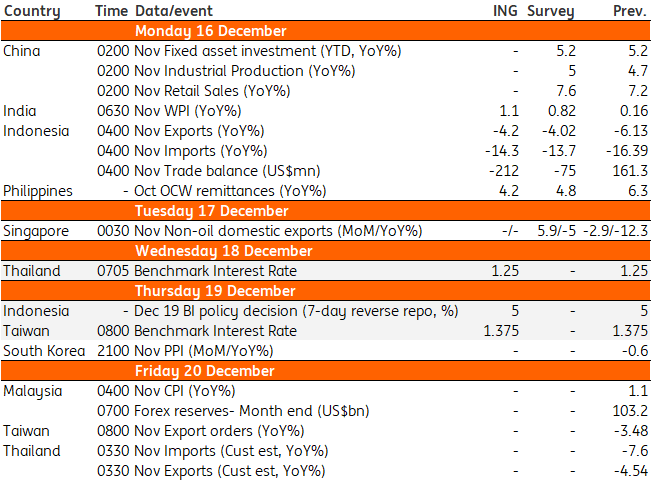Asia week ahead: Central banks getting busy again… for nothing
Central banks in Japan, Taiwan and Thailand meet next week, but rest assured there won't be much action, if any at all
Busy doing nothing
Central banks in Japan, Taiwan, Thailand and Indonesia meet next week and all are expected to leave policies on hold.
In Japan, last week’s announcement of US$121 billion in fresh stimulus has taken the juice out of the Bank of Japan meeting, which otherwise also was going to be a boring event anyway with no ammunition left to support growth. Taiwan’s central bank hasn’t done any easing in this cycle so far and, with GDP growth holding up pretty well, we don’t expect it to alter the existing policy settings anytime soon.
In Thailand, prolonged weak growth prospects ahead warrant some more Bank of Thailand rate cuts on top of two 25bp cuts this year, while inflation continues to be absent. Indeed, the Bank of Thailand has doors open for more cuts, though it’s likely to cite an additional US$3.3 billion worth of fiscal stimulus announced in late November as a reason to stay on hold next week.
The next batch of China’s November economic data – industrial production, fixed-asset investment, retail sales, and home prices – will be an interesting watch for GDP in the current quarter. A surprising bounce in both manufacturing and non-manufacturing purchasing manager indexes foreshadowed November to be a better activity month after a holiday-distorted October.
Finally, Australia’s jobs report will give some idea about the depth of the economic weakness in the current quarter, following a disappointing 3Q19 growth merited further Reserve Bank of Australia rate cuts in early 2020. A turnaround in the employment growth in November after an unexpected 19,000 fall in the previous month could upset central bank policy expectations.

Download
Download article
13 December 2019
Our view on next week’s key events This bundle contains 3 Articles"THINK Outside" is a collection of specially commissioned content from third-party sources, such as economic think-tanks and academic institutions, that ING deems reliable and from non-research departments within ING. ING Bank N.V. ("ING") uses these sources to expand the range of opinions you can find on the THINK website. Some of these sources are not the property of or managed by ING, and therefore ING cannot always guarantee the correctness, completeness, actuality and quality of such sources, nor the availability at any given time of the data and information provided, and ING cannot accept any liability in this respect, insofar as this is permissible pursuant to the applicable laws and regulations.
This publication does not necessarily reflect the ING house view. This publication has been prepared solely for information purposes without regard to any particular user's investment objectives, financial situation, or means. The information in the publication is not an investment recommendation and it is not investment, legal or tax advice or an offer or solicitation to purchase or sell any financial instrument. Reasonable care has been taken to ensure that this publication is not untrue or misleading when published, but ING does not represent that it is accurate or complete. ING does not accept any liability for any direct, indirect or consequential loss arising from any use of this publication. Unless otherwise stated, any views, forecasts, or estimates are solely those of the author(s), as of the date of the publication and are subject to change without notice.
The distribution of this publication may be restricted by law or regulation in different jurisdictions and persons into whose possession this publication comes should inform themselves about, and observe, such restrictions.
Copyright and database rights protection exists in this report and it may not be reproduced, distributed or published by any person for any purpose without the prior express consent of ING. All rights are reserved.
ING Bank N.V. is authorised by the Dutch Central Bank and supervised by the European Central Bank (ECB), the Dutch Central Bank (DNB) and the Dutch Authority for the Financial Markets (AFM). ING Bank N.V. is incorporated in the Netherlands (Trade Register no. 33031431 Amsterdam).